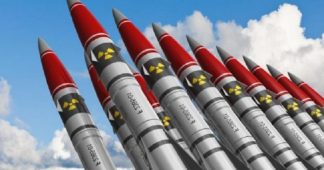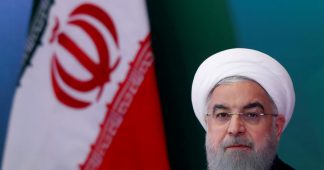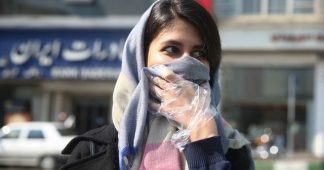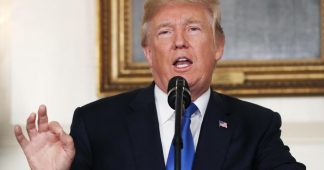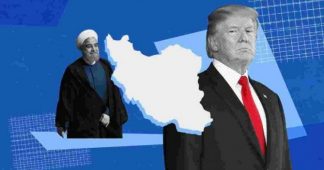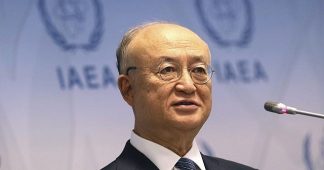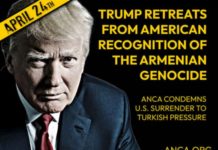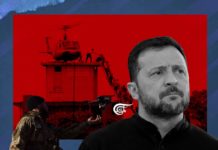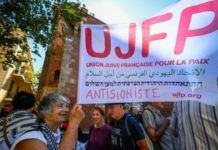By Medea Benjamin and Nicolas J. S. Davies
May 29, 2020
On May 6th, President Trump vetoed a war powers bill specifying that he must ask Congress for authorization to use military force against Iran. Trump’s “maximum pressure” campaign of deadly sanctions and threats of war against Iran has seen no let-up, even as the U.S., Iran and the whole world desperately need to set aside our conflicts to face down the common danger of the Covid-19 pandemic.
So what is it about Iran that makes it such a target of hostility for Trump and the neocons? There are many repressive regimes in the world, and many of them are close US allies, so this policy is clearly not based on an objective assessment that Iran is more repressive than Egypt, Saudi Arabia or other monarchies in the Persian Gulf.
The Trump administration claims that its “maximum pressure” sanctions and threats of war against Iran are based on the danger that Iran will develop nuclear weapons. But after decades of inspections by the International Atomic Energy Agency (IAEA) and despite the US’s politicization of the IAEA, the Agency has repeatedly confirmed that Iran does not have a nuclear weapons program.
If Iran ever did any preliminary research on nuclear weapons, it was probably during the Iran-Iraq War in the 1980s, when the US and its allies helped Iraq to make and use chemical weapons that killed up to 100,000 Iranians. A 2007 USNational Intelligence Estimate, the IAEA’s 2015 “Final Assessment on Past and Present Outstanding Issues” and decades of IAEA inspections have examined and resolved every scrap of false evidence of a nuclear weapons program presented or fabricated by the CIA and its allies.
If, despite all the evidence, US policymakers still fear that Iran could develop nuclear weapons, then adhering to the Iran Nuclear Deal (JCPOA), keeping Iran inside the Non-Proliferation Treaty, and ensuring ongoing access by IAEA inspectors would provide greater security than abandoning the deal.
As with Bush’s false WMD claims about Iraq in 2003, Trump’s real goal is not nuclear non-proliferation but regime change. After 40 years of failed sanctions and hostility, Trump and a cabal of US warhawks still cling to the vain hope that a tanking economy and widespread suffering in Iran will lead to a popular uprising or make it vulnerable to another U.S.-backed coup or invasion.
United Against a Nuclear Iran and the Counter Extremism Project
One of the key organizations promoting and pushing hostility towards Iran is a shadowy group called United Against a Nuclear Iran (UANI). Founded in 2008, it was expanded and reorganized in 2014 under the umbrella of the Counter Extremism Project United (CEPU) to broaden its attacks on Iran and divert US policymakers’ attention away from the role of Israel, Saudi Arabia, the United Arab Emirates and other US allies in spreading violence, extremism and chaos in the greater Middle East.
UANI acts as a private enforcer of US sanctions by keeping a “business registry” of hundreds of companies all over the world – from Adidas to Zurich Financial Services – that trade with or are considering trading with Iran. UANI hounds these companies by naming and shaming them, issuing reports for the media, and urging the Office of Foreign Assets Control to impose fines and sanctions. It also keeps a checklist of companies that have signed a declaration certifying they do not conduct business in or with Iran.
Proving how little they care about the Iranian people, UANI even targets pharmaceutical, biotechnology, and medical-device corporations – including Bayer, Merck, Pfizer, Eli Lilly, and Abbott Laboratories – that have been granted special US humanitarian aid licenses.
Where does UANI get its funds?
UANI was founded by three former US officials, Dennis Ross, Richard Holbrooke and Mark Wallace. In 2013, it still had a modest budget of $1.7 million, nearly 80% coming from two Jewish-American billionaires with strong ties to Israel and the Republican Party: $843,000 from precious metals investor Thomas Kaplan and $500,000 from casino owner Sheldon Adelson. Wallace and other UANI staff have also worked for Kaplan’s investment firms, and he remains a key funder and advocate for UANI and its affiliated groups.
In 2014, UANI split into two entities: the original UANI and the Green Light Project, which does business as the Counter Extremism Project. Both entities are under the umbrella of and funded by a third, Counter Extremism Project United (CEPU). This permits the organization to brand its fundraising as being for the Counter Extremism Project, even though it still regrants a third of its funds to UANI.
CEO Mark Wallace, Executive Director David Ibsen and other staff work for all three groups in their shared offices in Grand Central Tower in New York. In 2018, Wallace drew a combined salary of $750,000 from all three entities, while Ibsen’s combined salary was $512,126.
In recent years, the revenues for the umbrella group, CEPU, have mushroomed, reaching $22 million in 2017. CEPU is secretive about the sources of this money. But investigative journalist Eli Clifton, who starting looking into UANI in 2014 when it was sued for defamation by a Greek ship owner it accused of violating sanctions on Iran, has found evidence suggesting financial ties with Saudi Arabia and the United Arab Emirates.
That is certainly what hacked emails between CEPU staff, an Emirati official and a Saudi lobbyist imply. In September 2014, CEPU’s president Frances Townsend emailed the UAE Ambassador to the US to solicit the UAE’s support and propose that it host and fund a CEPU forum in Abu Dhabi.
Four months later, Townsend emailed again to thank him, writing, “And many thanks for your and Richard Mintz’ (UAE lobbyist) ongoing support of the CEP effort!” UANI fundraiser Thomas Kaplan has formed a close relationship with Emirati ruler Bin Zayed, and visited the UAE at least 24 times. In 2019, he gushed to an interviewer that the UAE and its despotic rulers “are my closest partners in more parts of my life than anyone else other than my wife.”
Another email from Saudi lobbyist and former Senator Norm Coleman to the Emirati Ambassador about CEPU’s tax status implied that the Saudis and Emiratis were both involved in its funding, which would mean that CEPU may be violating the Foreign Agents Registration Act by failing to register as a Saudi or Emirati agent in the US
Ben Freeman of the Center for International Policy has documented the dangerously unaccountable and covert expansion of the influence of foreign governments and military-industrial interests over US foreign policy in recent years, in which registered lobbyists are only the “tip of the iceberg” when it comes to foreign influence. Eli Clifton calls UANI, “a fantastic case study and maybe a microcosm of the ways in which American foreign policy is actually influenced and implemented.”
CEPU and UANI’s staff and advisory boards are stocked with Republicans, neoconservatives and warhawks, many of whom earn lavish salaries and consulting fees. In the two years before President Trump appointed John Bolton as his National Security Advisor, CEPU paid Bolton $240,000 in consulting fees. Bolton, who openly advocates war with Iran, was instrumental in getting the Trump administration to withdraw from the nuclear deal.
UANI also enlists Democrats to try to give the group broader, bipartisan credibility. The chair of UANI’s board is former Democratic Senator Joe Lieberman, who was known as the most pro-Zionist member of the Senate. A more moderate Democrat on UANI’s board is former New Mexico governor and UN ambassador Bill Richardson.
Norman Roule, a CIA veteran who was the National Intelligence Manager for Iran throughout the Obama administration was paid $366,000 in consulting fees by CEPU in 2018. Soon after the brutal Saudi assassination of journalist Jamal Khassoghi, Roule and UANI fundraiser Thomas Kaplan met with Crown Prince Mohammed Bin Salman in Saudi Arabia, and Roule then played a leading role in articles and on the talk-show circuit whitewashing Bin Salman’s repression and talking up his superficial “reforms” of Saudi society.
More recently, amid a growing outcry from Congress, the UN and the European Union to ease US sanctions on Iran during the pandemic, UANI chairman Joe Lieberman, CEPU president Frances Townsend and CEO Mark Wallace signed a letter to Trump that falsely claimed, “US sanctions neither prevent nor target the supply of food, medicine or medical devices to Iran,” and begged him not to relax his murderous sanctions because of COVID-19. This was too much for Norman Roule, who tossed out his UANI script and told the Nation, “the international community should do everything it can to enable the Iranian people to obtain access to medical supplies and equipment.”
Two Israeli shell companies to whom CEPU and UANI have paid millions of dollars in “consulting fees” raise even more troubling questions. CEPU has paid over $500,000 to Darlink, located near Tel Aviv, while UANI paid at least $1.5 million to Grove Business Consulting in Hod Hasharon, about 10% of its revenues from 2016 to 2018. Neither firm seems to really exist, but Grove’s address on UANI’s IRS filings appears in the Panama Papers as that of Dr. Gideon Ginossar, an officer of an offshore company registered in the British Virgin Islands that defaulted on its creditors in 2010.
Selling a Corrupted Picture to US Policymakers
UANI’s parent group, Counter Extremism Project United, presents itself as dedicated to countering all forms of extremism. But in practice, it is predictably selective in its targets, demonizing Iran and its allies while turning a blind eye to other countries with more credible links to extremism and terrorism.
UANI supports accusations by Trump and US warhawks that Iran is “the world’s worst state sponsor of terrorism,” based mainly on its support for the Lebanese Shiite political party Hezbollah, whose militia defends southern Lebanon against Israel and fights in Syria as an ally of the government.
But Iran placed UANI on its own list of terrorist groups in 2019 after Mark Wallace and UANI hosted a meeting at the Roosevelt Hotel in New York that was mainly attended by supporters of the Mujahedin-e-Kalqh (MEK). The MEK is a group that the US government itself listed as a terrorist organization until 2012 and which is still committed to the violent overthrow of the government in Iran – preferably by persuading the US and its allies to do it for them. UANI tried to distance itself from the meeting after the fact, but the published program listed UANI as the event organizer.
On the other hand, there are two countries where CEPU and UANI seem strangely unable to find any links to extremism or terrorism at all, and they are the very countries that appear to be funding their operations, lavish salaries and shadowy “consulting fees”: Saudi Arabia and the United Arab Emirates.
Many Americans are still demanding a public investigation into Saudi Arabia’s role in the crimes of September 11th. In a court case against Saudi Arabia brought by 9/11 victims’ families, the FBI recently revealed that a Saudi Embassy official, Mussaed Ahmed al-Jarrah, provided crucial support to two of the hijackers. Brett Eagleson, a spokesman for the families whose father was killed on September 11th, told Yahoo News, “(This) demonstrates there was a hierarchy of command that’s coming from the Saudi Embassy to the Ministry of Islamic Affairs [in Los Angeles] to the hijackers.”
The global spread of the Wahhabi version of Islam that unleashed and fueled Al Qaeda, ISIS and other violent Muslim extremist groups has been driven primarily by Saudi Arabia, which has built and funded Wahhabi schools and mosques all over the world. That includes the King Fahd Mosque in Los Angeles that the two 9/11 hijackers attended.
It is also well documented that Saudi Arabia has been the largest funder and arms supplier for the Al Qaeda-led forces that have destroyed Syria since 2011, including CIA-brokered shipments of thousands of tons of weapons from Benghazi in Libya and at least eight countries in Eastern Europe. The UAE also supplied arms funding to Al Qaeda-allied rebels in Syria between 2012 and 2016, and the Saudi and UAE roles have now been reversed in Libya, where the UAE is the main supplier of thousands of tons of weapons to General Haftar’s rebel forces. In Yemen, both the Saudis and Emiratis have committed war crimes. The Saudi and Emirati air forces have bombed schools, clinics, weddings and school buses, while the Emiratis tortured detainees in 18 secret prisons in Yemen.
But United Against a Nuclear Iran and Counter Extremism Project have redacted all of this from the one-sided worldview they offer to US policymakers and the American corporate media. While they demonize Iran, Qatar, Hezbollah and the Muslim Brotherhood as extremists and terrorists, they depict Saudi Arabia and the UAE exclusively as victims of terrorism and allies in U.S.-led “counterterrorism” campaigns, never as sponsors of extremism and terrorism or perpetrators of war crimes.
The message of these groups dedicated to “countering extremism” is clear and none too subtle: Saudi Arabia and the UAE are always US allies and victims of extremism, never a problem or a source of danger, violence or chaos. The country we should all be worrying about is – you guessed it – Iran. You couldn’t pay for propaganda like this! But on the other hand, if you’re Saudi Arabia or the United Arab Emirates and you have greedy, corrupt Americans knocking on your door eager to sell their loyalty, maybe you can.
Medea Benjamin is cofounder of CODEPINK for Peace, and author of several books, including Inside Iran: The Real History and Politics of the Islamic Republic of Iran.
Nicolas J. S. Davies is an independent journalist, a researcher with CODEPINK and the author of Blood On Our Hands: the American Invasion and Destruction of Iraq.
